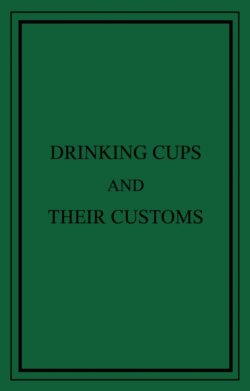Читать книгу Drinking Cups And Their Customs - George Edwin Roberts - Страница 7
На сайте Литреса книга снята с продажи.
PREFACE.
Оглавление__________
THE principal object of these pages is to furnish a collection of recipes for the brewing of compound drinks, technically called “Cups”, all of which have been selected with the most scrupulous attention to the rules of gastronomy, and their virtues tested and approved by repeated trials. These we are inclined to put into type, from a belief that, if they were more generally adopted, it would be the means of getting rid of a great deal of that stereotyped drinking which at present hold sway at the festive boards of England. In doing this, we have endeavored to simplify the matter as much as possible, adding such hints and remarks as may prove serviceable to the uninitiated, whilst we have discarded a goodly number of modern compounds as unpalatable and unscientific. As, in this age of progress, most things are raised to the position of a science, we see no reason why Bacchanology, if the term please our readers, should not hold a respectable place, and be entitled to its due mead of praise; so, by way of introduction, we have ventured to take a cursory glance at the customs which have been attached to drinking from the earliest periods to the present time. This, however, we set forth as no elaborate history, but only as an arrangement of such scraps as have from time to time fallen in our way, and have helped us to form ideas of the social manners of bygone times.
We have selected a sprig of Borage for our frontispiece, by reason of the usefulness of that pleasant herb in the flavoring of cups. Elsewhere than in England, plants for flavouring are accounted of rare virtue. So much are they esteemed in the East, that an anti-Brahminical writer, showing the worthlessness of Hindu superstitions, says, “They command you to cut down a living and sweet basil-plant, that you may crown a lifeless stone.” Our use of flavoring-herbs is the reverse of this justly condemned one; for we crop them that hearts may be warmed and life lengthened.
And here we would remark, that although our endeavors are directed towards the resuscitation of better times than those we live in, times of heartier customs and of more genial ways, we raise no lamentation for the departure of the golden age, in the spirit of Hoffmann von Fallersleben, who sings:-
“Would our bottles but grow deeper,
Did our wine but once get cheaper,
Then on earth there might unfold
The golden times, the age of gold!
“But not for us; we are commanded
To go with temperance even-handed.
The golden age is for the dead:
We’ve got the paper age instead!
“For, ah! our bottles still decline,
And daily dearer grows our wine,
And flat and void our pockets fall;
Faith! soon there’ll be no times at all!”
This is rather the cry of those who live that they may drink, than of our wiser selves, who drink that we may live. In truth, we are not dead to the charms of other drinks, in moderation. The apple has had a share of our favor, being recommended to our literary notice by an olden poet–
“Praised and caress’d, the tuneful Phillips sung
Of cyder famed, whence first his laurels sprung;”
and we have looked with a friendly eye upon the wool of a porter-pot, and involuntarily apostrophized it in the words of the old stanza,
“Rise then, my Muse, and to the world proclaim
The mighty charms of porter’s potent name,”
without the least jealous feeling being aroused at the employment of a Muse whose labors ought to be secured solely for humanity; but a cup-drink, little and good, will, for its social and moral qualities, ever hold the chief place in our likings.
Lastly, although we know many of our friends to be first-rate judges of pleasant beverages, yet we believe that but few of them are acquainted with their composition or history in times past. Should, therefore, any hints we may have thrown out assist in adding to the conviviality of the festive board, we feel we shall not have scribbled in vain; and we beg especially to dedicate this bagatelle to all those good souls who have been taught by experience that a firm adhesion to the “pigskin”, and a rattling gallopade to the music of the twanging horn and the melody of the merry Pack, is the best incentive to the enjoyment of all good things, especially good appetite, good fellowship, and
GOOD HEALTH.
. . . . . . And, although alone,
We’ll drain one draught in
Memory of many a joyous
Banquet past.
